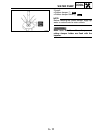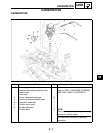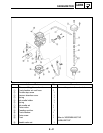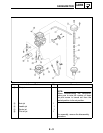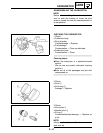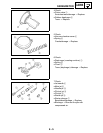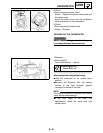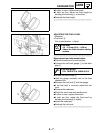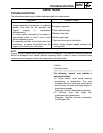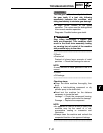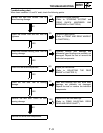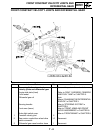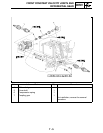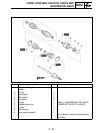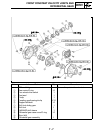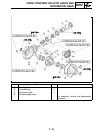
7 - 1
DRIV
TROUBLESHOOTING
DRIVE TRAIN
TROUBLESHOOTING
The following conditions may indicate damaged shaft drive components:
N
OTE:
Areas A, B, and C above may be extremely difficult to diagnose. The symptoms are quite subtle and
difficult to distinguish from normal machine operating noise. If there is reason to believe these
components are damaged, remove the components and check them.
Symptoms Possible Causes
1.A pronounced hesitation or “jerky” movement
during acceleration, deceleration, or sustained
speed. (This must not be confused with
engine surging or transmission
characteristics.)
2.A “rolling rumble” noticeable at low speed; a
high-pitched whine; a “clunk” from a shaft
drive component or area.
3.A locked-up condition of the shaft drive train
mechanism, no power transmitted from the
engine to the front and/or rear wheel.
A.Bearing damage.
B.Improper gear lash.
C.Gear tooth damage.
D.Broken drive shaft.
E.Broken gear teeth.
F. Seizure due to lack of lubrication.
G.Small foreign objects lodged between the
moving parts.
1.Check:
●
Unusual noises
*****************************************************
The following “noises” may indicate a
mechanical defect:
a.A “rolling rumble” noise during coasting,
acceleration, or deceleration. The noise
increases with front and/or rear wheel speed,
but it does not increase with higher engine or
transmission speeds.
Diagnosis: Possible wheel bearing damage.
b.A “whining” noise that varies with
acceleration and deceleration.
Diagnosis: Possible incorrect reassembly,
too-little gear lash.



